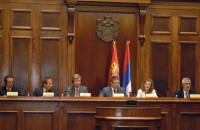 Your Excellences, Dear Colleagues from Montenegro and Bosnia and Herzegovina, Ladies and Gentlemen,
Your Excellences, Dear Colleagues from Montenegro and Bosnia and Herzegovina, Ladies and Gentlemen,
We are gathered here today, at the National Assembly, to assess the prospects of the Balkan countries for achieving the level of mutual relations, to the extent that exist between Sweden, Norway, Denmark and Finland, the Nordic countries whose history is similar to ours – as it is, colloquially said, rich with turbulent events – which, at first glance, does not give rise to the assumption that between those countries could be a close cooperation which we today, rightfully, call the successful Nordic model of cooperation.
The necessity of the Western Balkan countries to benefit from the experience of the Scandinavian countries so as to solve the outstanding issues between them as well as elevate mutual relations and cooperation to the highest level possible is apparent.
Ladies and Gentlemen, Dear Colleagues, the present-day issues concerning the economy, among other areas, confirms that we are connected not only by common history and similar patterns of behavior, but also by common interest to seek the common solutions to the problems that concern us all.
Our bilateral and multilateral cooperation, in particular between the parliaments, has showed the ones who had the courage to see it, that the agreement on minimum common interest would allow for our voice to be more compelling and more respected. With the purpose of achieving that, we need to break from the past to which we are often brought back if not by ourselves then by others whose interest is for our region to be bypassed by the rest of the world both politically and economically. Maybe this is the reason why the appropriate model of cooperation for all of us lies in the example of the Nordic countries whose mutual relations are the indicators that it is possible to work together at almost every level and build lasting and beneficial relationships.
Similar to the Balkans, the Nordic countries used to engage into conflicts, led wars against each other, and used to belong to various forms of state associations.
Nordic model, before all, recognizes that the key prerequisite for cooperation is respect for diversity. That cooperation has brought about a number of advantages to the Nordic region, compared to other parts of Europe.
The most important thing regarding the acceptance of this model is that, first and foremost, there has to be political will for close cooperation. Cooperation between the Nordic countries is strong enough, regardless of the fact that not all of them are EU member states, not all of those countries have the EURO as a currency nor are they all members of NATO alliance. However, their cooperation provides a number of advantages in the Nordic region, compared to other parts of Europe.
Regional cooperation has enabled those countries to remove barriers in the area of trade, which means that they have a stronger region from which they can enter the world of commerce with their products and services, as well as their booming market economy. Furthermore, there is a free flow of goods in the Nordic region which facilitates common marketing. Also, there is a very close diplomatic cooperation as well as joint representation at international forums.
Ladies and Gentlemen, Dear Colleagues, it is apparent that there is a number of similarities in our region, such as common history, common culture and similar languages. Nevertheless, it is also apparent the need for political will, which could commence with a joint statement or declaration in support of the aspirations of the countries in the region.
It is also evident that the citizens of the Western Balkan countries have successfully overcome certain disparities, which the politics failed to achieve. Hence, if we are referring to a vision here we can surely agree that it does exists, but we can also agree that it is still quite uncertain the extent to which the political opportunism and inertia will persist according to which, in the moments of political uncertainty, there will always be those who, like in the Roman Senate, conclude their statements with – “I think that Carthage should be burned.”
Last but not least, it should be publicly addressed that there is an increasing awareness on the necessity of regional cooperation. Also, I am under the impression that we all have the sense that, at this point in time, we are standing at a crossroad. The Igman Initiative represents one of the possible indicators of the methods and directions for further progress. Finding solutions to the issues of ordinary people could create the critical mass that will boost up the politics and encourage the politicians in the region to change their rhetoric and ambitions as this is about the practical issues and objectives which determine the fate of people.
The National Assembly of the Republic of Serbia does not overlook the fact that it represents the citizens and that it should advocate for their wellbeing for the reason that the citizens have chosen willingly and freely. In our view, providing support to the implementation of this Igman Initiative project is of great importance as it could set off the cooperation that could be beneficial to all of us.
Thank you!

